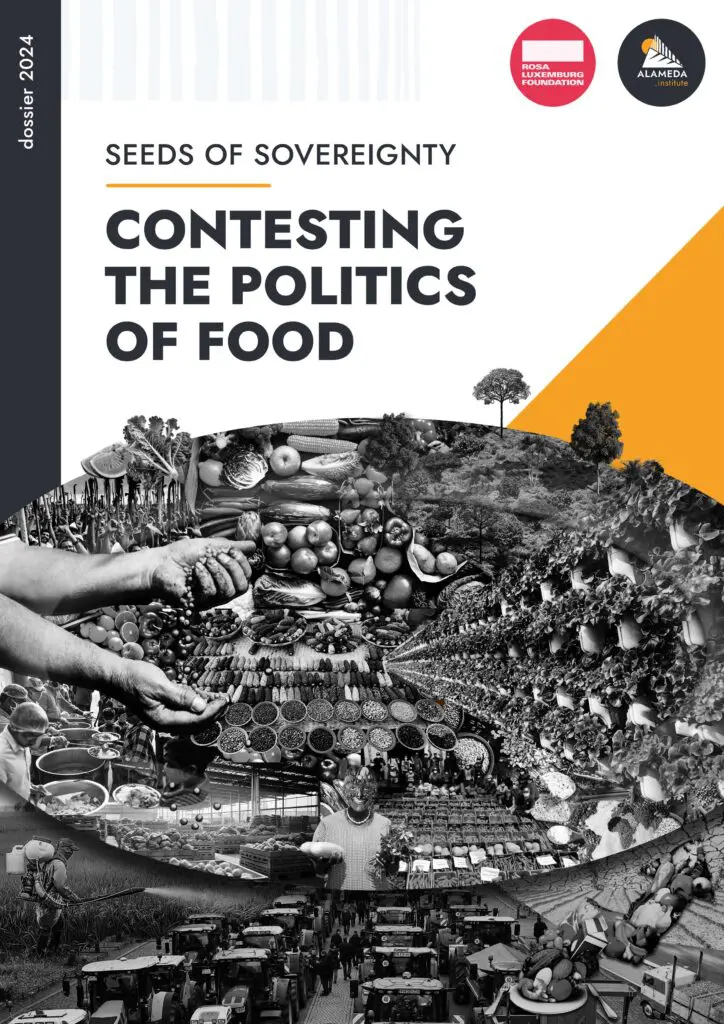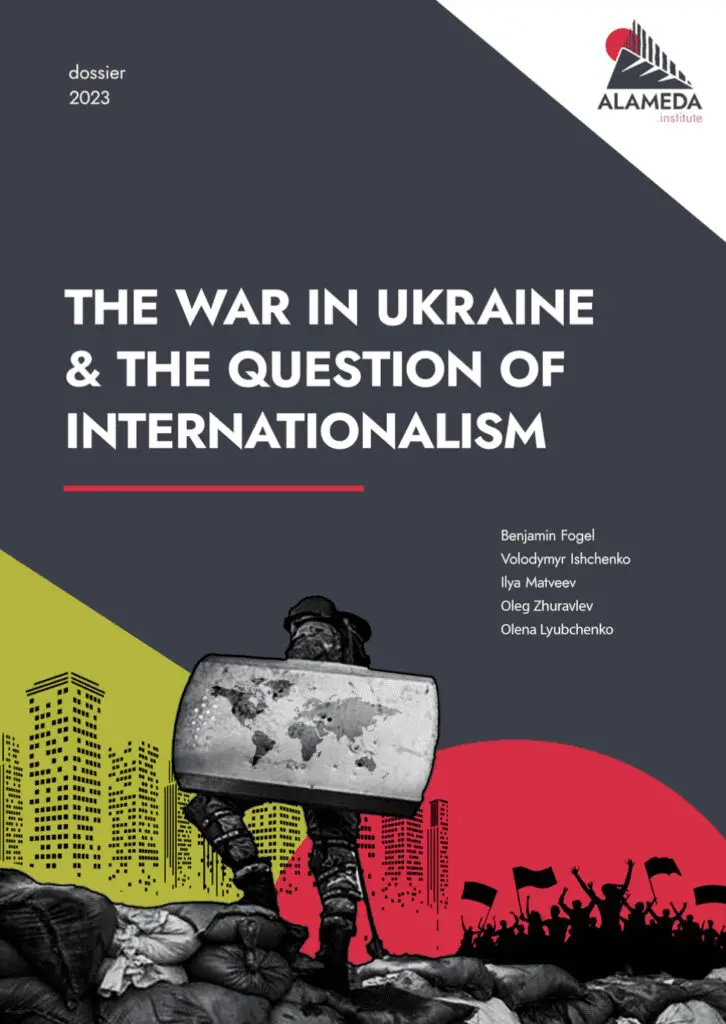XI / Soberania e a policrise
A soberania é geralmente definida em relação ao Estado-nação, com atenção às fronteiras e à formação do Estado, ao controle do território e dos recursos e à autodeterminação dos povos. Mas, embora a questão nacional não possa ser ignorada, o internacionalista deve considerar a soberania separadamente dela.
Uma perspectiva internacionalista é aquela que reconhece a necessidade de coordenação de forças em todo o mundo, não apenas porque os ideais universais de emancipação e justiça fornecem uma base para a solidariedade, mas também porque até mesmo as questões locais mais específicas estão conectadas a fenômenos político-econômicos e ecológicos mais amplos que operam simultaneamente dentro e fora das fronteiras. De fato, a existência de antigas e novas fronteiras (e nacionalismos) afeta diretamente a forma como as organizações políticas interagem e respondem umas às outras em todo o mundo.
Embora o internacionalismo lide com as ações do Estado, ele se torna necessário devido à impossibilidade de abordar um problema em um Estado sem considerar os outros e as lutas dentro deles. O internacionalismo também olha para além das relações entre os Estados, para as formações sociais e políticas, identificando como os atores se esforçam para se conectar uns aos outros. Ele reconhece conflitos entre interesses nacionais e de classe ao longo do caminho, como quando a estabilidade econômica de um país é garantida por meio de relações econômicas internacionais que destroem ecossistemas em outros lugares.
O desenvolvimento capitalista é historicamente desigual e contraditório. Há padrões de trocas ecológicas e econômicas desiguais por meio dos quais os recursos naturais são retirados de um lugar para serem usados na produção industrial em outro, enquanto a mão de obra barata no primeiro garante que a classe trabalhadora local não possa colher os benefícios dos produtos manufaturados e do investimento em infraestrutura pública no segundo.
Essas contradições no desenvolvimento se intensificaram ao longo de séculos de comércio global e colonialismo e, em uma época de grandes crises e competição por recursos, elas nos instigam a pensar na soberania além da perspectiva de apenas um povo. Por exemplo, os minerais essenciais necessários para a ‘transição justa’ na Europa geralmente vêm de lugares como a América Latina, onde os trabalhadores são mal pagos e seus ecossistemas são danificados. Quão justa é essa transição se os interesses nacionais de um prejudicam os de outro?
Nos últimos anos, três ‘eventos’ contribuíram muito para a atual policrise. E eles demonstraram como a economia política internacional de produção e consumo, embutida nas disputas imperiais e nas relações centro-periferia, afeta as relações entre os povos e suas organizações globalmente: a pandemia de Covid-19, a guerra na Ucrânia e a emergência climática.
Este ensaio pede que sejam repensadas as concepções tradicionais de soberania em uma época de múltiplas crises, especificamente de policrise, A crise política é um fenômeno que ocorre em um contexto de crise política, no qual os riscos e impactos adicionais de sua interconexão formam um todo potencialmente mais destrutivo do que a soma de todas as partes. Ele enfatiza que a complexidade e os riscos adicionais da policrise tornam ineficiente e obsoleta uma abordagem puramente nacionalista da soberania. A defesa dos interesses soberanos das nações pode, na verdade, contribuir ainda mais para o agravamento das crises devido à sua interconexão.
Além disso, aborda o papel central da extração de recursos e do crescimento econômico na afirmação da soberania do Estado em tempos de paz, bem como seu propósito em tempos de guerra e incerteza global. Ele propõe que uma visão internacionalista da soberania no século XXI deve reconhecer a natureza dos conflitos internacionais entre classes e levanta a necessidade de redefinir a soberania de acordo com a sustentabilidade radical.
Crises crescentes, respostas desiguais
Do ponto de vista dos países localizados na periferia do sistema capitalista global, a crise é um fenômeno contínuo, e não uma exceção. As economias dependem dos fluxos e refluxos dos países mais ricos, a agitação política é comum (às vezes fomentada por agentes estrangeiros) e há mais suscetibilidade a distúrbios devido à falta de um sistema de bem-estar forte, à intervenção imperialista e a menos recursos para enfrentar novos desafios.
Embora se possa afirmar que a crise é o estado padrão nas margens, nem sempre é a mesma crise. A noção de policrise aqui é útil, pois aborda não apenas a soma das crises simultâneas - globais e locais - mas também como elas impactam umas às outras e levam a um cenário de maior instabilidade, mais riscos e resultados menos previsíveis. Atualmente, há várias crises de escala global, que, como sugerem Scott Janzwood e Thomas Homer-Dixon, implicam ‘extrema complexidade, A maioria das empresas tem um alto grau de não linearidade, causalidade transfronteiriça e profunda incerteza’.
Uma análise de classe da pandemia de Covid-19, da guerra na Ucrânia e da emergência climática começa com o reconhecimento de que as forças sistêmicas do capital ajudaram a produzir cada uma dessas crises e que cada uma delas tem um impacto negativo específico sobre os trabalhadores. No caso da Covid-19, os pesquisadores têm demonstrado consistentemente que entramos em uma era de considerável vulnerabilidade a pandemias devido a mudanças em paisagens e ecossistemas e à maneira como a sociedade interage com outras espécies.
O biólogo evolucionário Rob Wallace ressalta que os novos vírus não podem ser tratados como incidentes isolados, pois seu surgimento está profundamente ligado ao sistema dominante de produção de alimentos, ao comportamento das corporações multinacionais e à indução pelo capital de arranjos específicos de vida humana que levam a focos de doenças. A forma como as sociedades respondem à disseminação de doenças também é política, sujeita às estruturas de poder capitalista e às formas de propriedade privada. A intervenção do Estado no primeiro período da pandemia de Covid-19 levou os especialistas a afirmar que o ‘Estado estava de volta’ depois de um longo recuo sob o neoliberalismo.
O aumento dos níveis de gastos públicos em saúde, a compra de vacinas e as políticas centralizadas de distanciamento social e lockdowns minaram a normalização da autorregulação do mercado neoliberal, mas não trouxeram alternativas ao regime existente de propriedade privada e lucro. Como diz Adam Tooze, as iniciativas eram de cima para baixo, dificilmente influenciadas pela luta de classes, e foram projetadas principalmente para estabilizar as economias que agora tinham de se adaptar à crise sanitária.
Se, em nível nacional, os governos ajustaram seus orçamentos para evitar mais complicações decorrentes da pandemia e perdas econômicas, internacionalmente a situação oscilou principalmente entre a coordenação regional para o controle de fronteiras e tentativas fracassadas de acordos que poderiam abordar algumas das desigualdades na área da saúde em todo o mundo. Os esforços para obter uma isenção do TRIPS (Aspectos dos Direitos de Propriedade Intelectual Relacionados ao Comércio) para vacinas acabaram em um grande fracasso, enquanto as empresas farmacêuticas, que receberam uma quantia sem precedentes de dinheiro público, acumularam lucros enormes.
Na periferia, os estados não tinham recursos para acessar as vacinas ou estavam sob o controle de governos autoritários que sacrificavam vidas para ‘salvar’ a economia, como foi o caso do Brasil. Nesses contextos, em que o subdesenvolvimento prejudica a infraestrutura de saúde, os Estados negociaram com potências emergentes ou atores humanitários para garantir as vacinas. Mas pouco foi feito para abordar as ‘estruturas de emergência de doenças’ que Mike Davis discutiu em relação às configurações rurais e urbanas capitalistas.
Apenas dois anos após o início da pandemia, a invasão da Ucrânia pela Rússia provocou outra onda de debates sobre a forma que o internacionalismo deve assumir. Obviamente, esse não é o único conflito armado no mundo atualmente, nem mesmo o mais mortal. O influxo de ajuda humanitária e a preocupação com a Ucrânia, especialmente com a chegada de refugiados às capitais europeias, levaram a críticas abertas sobre como as sociedades predominantemente brancas dos países mais ricos respondem com menos urgência e compaixão à guerra e ao terror no Sul Global. Isso pode ser explicado com referência ao que Oyenike Balogun-Mwangi chama de ‘empatia intergrupal’, bem como à dinâmica geopolítica que expõe a busca de interesses por grandes potências e, de fato, por estados da periferia.
As tensões sobre o papel da OTAN no conflito fizeram com que os países do Sul Global recusassem uma posição binária sobre a guerra, assumindo uma posição de liderança. não alinhamento estratégico e tomar medidas diretas para construir uma ordem internacional mais multipolar. O presidente progressista do Brasil, Luiz Inácio Lula da Silva, recusou-se a assinar o documento final da Cúpula da Democracia liderada pelos EUA em 2023, pois a declaração condenava diretamente Putin em vez de estabelecer um plano apartidário para a paz. Conforme argumentado por James Traub, enquanto o Ocidente tentou vacinas para suínos e consistentemente falhou em fornecer financiamento adequado para a adaptação às mudanças climáticas em nações mais pobres, a China alocou bilhões de dólares para investimentos por meio da Belt and Road Initiative.
O cenário complexo de hoje expõe diferentes percepções de quem é responsável e quais interesses imperiais estão em jogo em cada conflito. Essas percepções, que influenciam as campanhas e os atos de solidariedade, são, evidentemente, impulsionadas pela ideologia e por interesses materiais.
Para os ocidentais, é muito mais fácil identificar horrores nas ações de Putin e do exército russo do que na dominação sistemática dos EUA e nas intervenções das potências ocidentais na América Latina, na África e no Oriente Médio. É mais fácil falar da Ucrânia como a questão do nosso tempo do que opinar sobre as guerras brutais no Iêmen ou em Tigray. Assim que a Rússia invadiu o território ucraniano, o governo canadense promulgou a Autorização de Viagem de Emergência Canadá-Ucrânia, enquanto os refugiados afegãos não tiveram direito aos mesmos processos facilitados, apesar de décadas de conflito e desespero contínuos.
O terceiro evento é a emergência climática, fundamental para a policrise na medida em que afeta todos os territórios e nações do mundo, embora de forma altamente desigual. A mudança climática não reconhece fronteiras - internas ou externas - mas, muitas vezes, seus efeitos mais brutais são ditados pela desigualdade que é historicamente moldada pelas ações de estados-nação preocupados com seus próprios interesses econômicos, em detrimento de outros. Isso fornece contexto para chamadas realizadas nas Nações Unidas para que os países ‘trabalhem em prol do interesse comum, além dos estreitos interesses nacionais’. Sim, a crise climática leva à deterioração das condições de vida e aumenta uma série de riscos de desastres globais, mas a posição de um país em termos de responsabilidade histórica pelo aquecimento global e sua capacidade atual de se envolver em projetos de transição está diretamente ligada ao tipo de interesses nacionais em jogo.
Os países que mais contribuíram para as mudanças climáticas são os que possuem a riqueza que lhes permitiria fazer transições rápidas e relativamente tranquilas rumo a uma sociedade mais sustentável e de baixo carbono - principalmente os Estados Unidos, o Reino Unido e os membros da União Europeia1; No entanto, também são elas que promovem paradigmas de transição que dão continuidade à tradição de saquear os recursos das nações mais pobres e usá-los em projetos que não alcançarão os resultados necessários para ficar abaixo de 1,5ºC. Pior ainda, esses são projetos e parâmetros que colocam o lucro acima das metas de transição e, por causa disso, mantêm os setores emissores em posições de poder que retardam o processo geral.
Nos EUA, embora as conversas em torno de um Green New Deal tenham ganhado impulso nos últimos anos, faltam compromissos para abandonar o uso de combustíveis fósseis e a transição da rede de energia ainda é refém de uma mentalidade de diversificação das fontes de combustível, em vez da substituição real e da mudança de infraestrutura necessária. Enquanto isso, pequenas nações pobres, como Tuvalu, pediram que a comunidade global agisse para eliminar gradualmente o uso de combustíveis fósseis, mas, como não é um grande produtor nem consumidor de combustíveis fósseis, seu apelo como país altamente vulnerável não tem o mesmo peso nas negociações políticas ditadas pelo mercado.
A ironia é que, enquanto as reivindicações de soberania de Tuvalu são prejudicadas pela perpetuação de uma economia global de combustível fóssil por outros Estados, em breve a soberania desses mesmos Estados que prosperam com o capital fóssil poderá ser ameaçada por desastres naturais e turbulências econômicas relacionadas às mudanças climáticas.
A soberania como uma capacidade internacionalista e contínua
A soberania econômica é convencionalmente entendida como independência de agentes externos, como organizações econômicas internacionais, e autonomia para gerenciar a balança comercial, a presença corporativa e a política macroeconômica. No capitalismo, ela está associada à autonomia dos produtores e dos mercados, o que, como Noam Chomsky apontou, a coloca em tensão com o conceito de soberania popular, que está associado aos direitos democráticos. Enquanto isso, no contexto de guerras e invasões, uma soberania política é frequentemente invocada para justificar a intervenção e a ocupação.
Mas um conceito internacionalista de soberania adequado a uma época de policrise deve se basear na noção de permanência, na capacidade de permanecer e prosperar. Essa noção sustenta os conceitos de soberania alimentar e soberania energética. Aquilo que é afirmado como soberano também deve ser duradouro. A soberania alimentar em uma comunidade significa mais do que apenas garantir a segurança alimentar; ela diz respeito às estruturas de produção e consumo e a um relacionamento alterado e socialmente mais justo entre os membros da comunidade que garanta a continuidade das práticas e seus benefícios. Da mesma forma, um conceito internacionalista de soberania geral de povos e Estados precisa ir além das fronteiras nacionais e dos interesses econômicos imediatos para promover a continuidade das relações de solidariedade que podem atender às causas estruturais da policrise, em vez de simplesmente seus efeitos localizados (aos quais a postura chauvinista é uma resposta comum e, em última análise, destrutiva).
O entendimento básico de que os povos marginalizados não estarão livres da exploração e do sofrimento em um lugar sem que essa liberdade seja estendida a outros povos também fala de solidariedade, mas também exige a consideração de uma complexa rede de contradições. Os conflitos baseados em recursos fragmentam as alianças e reforçam as disputas imediatas entre as classes, que muitas vezes enfraquecem os esforços internacionalistas para combater as causas fundamentais das crises.
No caso das vacinas, o poder das grandes empresas farmacêuticas levou a um apartheid geral de vacinas, segundo o qual os países que podiam pagar mais vacinas e garantir os contratos mais rápidos se beneficiavam no mercado pandêmico em detrimento de outros, que geralmente estavam localizados no Sul Global. Uma perspectiva excessivamente nacionalista de soberania - focada em questões sanitárias e segurança de fronteiras - também desempenhou um papel na distribuição desigual de vacinas. A solidariedade aqui foi, na melhor das hipóteses, uma reflexão tardia.
Em meio ao conflito entre a Rússia e a Ucrânia, houve diferentes reivindicações de soberania. O mais óbvio é que o governo ucraniano condenou o desrespeito da Rússia à sua soberania territorial. O governo russo também alegou que invadiu a Ucrânia para proteger sua própria soberania. Mas também há questões de soberania energética em jogo: o desenvolvimento dos gasodutos Nord Stream, disputas sobre quem compra gás fóssil e de quem. As sanções impostas pela União Europeia à Rússia foram parciais e deixaram a porta aberta para as importações de gás fóssil e urânio russos. Enquanto isso, as preocupações com uma crise de fornecimento de energia na Europa beneficiaram um projeto anterior para alterar a taxonomia da UE para rotular o gás fóssil e a energia nuclear como fontes de energia verde.
Em vez de agir para acelerar uma transição completa dos combustíveis fósseis, países como a Alemanha justificaram seu retrocesso na eliminação gradual do carvão e da energia nuclear como uma forma de mediar sua dependência do gás russo. Isso afeta negativamente as perspectivas de mitigação das mudanças climáticas, expondo como as guerras tradicionais podem ser travadas em nome da soberania territorial e dos interesses nacionais, contribuindo, em última análise, para uma maior vulnerabilidade climática, especialmente para as comunidades que não têm responsabilidade histórica por essas crises.
Quanto mais a crise climática se agrava, mais frágeis são as condições para que os países da periferia se adaptem aos impactos incrementais. Essa também é uma questão de soberania, pois está ligada à perda de território e de habitat, ao sofrimento econômico, à pressão sobre a migração e a todas as outras perdas subsequentes em termos de condições de vida, cultura, acesso a alimentos, água e fontes de energia, além da relação com outras espécies e ecossistemas. Como regra geral, as disputas entre grandes potências levam a práticas de imperialismo ecológico, principalmente por meio de trocas ecológicas desiguais e extrativismo.
A complexidade da policrise é tal que as reivindicações tradicionais de soberania acabam perpetuando desigualdades históricas, com consequências globais. Não apenas os interesses das classes dominantes são colocados acima dos interesses dos trabalhadores e de outras comunidades marginalizadas, mas as disparidades geopolíticas e as relações de dependência entre as nações se refletem em condições desiguais para enfrentar as crises em cada lugar, com os interesses dos vulneráveis nos países mais ricos às vezes colocados à frente dos interesses dos vulneráveis na periferia. Os Estados com mais capacidade de fornecer acesso à energia escolherão fazê-lo para suas próprias populações, mesmo que isso signifique transformar comunidades de outros lugares em zonas de sacrifício que sofrem as consequências do extrativismo sem colher nenhum benefício do aumento da capacidade energética.
A reafirmação de uma lógica de ‘primeiro nós, depois os outros’ funciona no curto prazo, mas aumenta os riscos sistêmicos apresentados pela policrise por meio da continuidade das mesmas práticas que criaram as crises e suas vulnerabilidades. O mesmo vale para as perspectivas desenvolvimentistas tradicionais na periferia, que reivindicam uma versão do ‘finalmente nós’ para argumentar a favor de sua própria vez de se envolver em extrativismo predatório, políticas anti-refugiados e medidas sanitárias chauvinistas a fim de afirmar sua própria soberania contra a interferência imperial e o neocolonialismo. A responsabilidade histórica dos outros é denunciada, mas a responsabilidade ecossistêmica de evitar a destruição do que resta e a necessidade de um sistema de solidariedade internacional são despriorizadas.
Um sistema de solidariedade internacionalista exige mais do que campanhas temporárias, esforços para aumentar a conscientização e ajuda. O papel da solidariedade no internacionalismo também é negociar conflitos imediatos em todo o mundo, reconhecendo que as condições adversas em um lugar podem ser causadas pelos termos de desenvolvimento em outro lugar e por uma divisão internacional do trabalho que, no final das contas, implica interesses diferentes para os trabalhadores em lugares diferentes - às vezes, interesses em desacordo uns com os outros, como seria o caso dos mineiros de lítio no Chile e de outras comunidades transformadas em zonas de sacrifício, dos trabalhadores da indústria de carros elétricos na Alemanha que buscam manter seus empregos e dos trabalhadores no Canadá que desejam comprar carros elétricos com incentivos do governo. As contradições nessas relações envolvem interesses locais e nacionais de diferentes tipos, e uma abordagem simples da defesa da soberania - em termos econômicos e territoriais - não consegue resolver as tensões e torna menos eficazes as campanhas de apoio às pessoas afetadas pelas práticas de mineração e às pessoas que lutam pelo transporte público.
Quanto mais complexo o cenário global se torna, mais é necessário mudar as perspectivas sobre a soberania para focar na capacidade contínua das pessoas em diferentes países e regiões. Os riscos significativos de catástrofe apresentados por uma combinação de crises ecológicas, sanitárias, econômicas e políticas exigem uma reavaliação do significado de soberania na práxis internacionalista. Devem ser desenvolvidos ‘mecanismos de solidariedade’ para a provisão não apenas do que é devido, mas também do que é justo. Isso poderia assumir a forma de reparações para garantir condições para que aqueles sem responsabilidade histórica assumam as responsabilidades necessárias para enfrentar a policrise.
As reparações devem incluir o cancelamento de dívidas coloniais injustas, uma vez que o endividamento contínuo dos Estados da periferia prejudica suas reivindicações de soberania - e isso se agrava quando, em resposta à policrise, a única opção é contrair novas dívidas para financiar a construção de infraestrutura crítica. Essa também é uma visão de sustentabilidade radical orientada para o estabelecimento de um melhor equilíbrio nas relações entre os seres humanos e o planeta que ocupamos. A perpetuação da dependência dos combustíveis fósseis como forma de garantir a soberania hoje prejudica a soberania no futuro, quando as condições de transição serão mais difíceis, a policrise mais complexa e os recursos cada vez mais escassos.
A policrise revela que a soberania não é apenas uma questão de controle ou domínio. Ela também está relacionada à capacidade das nações e comunidades de se manterem sozinhas e unidas. Como os riscos para a humanidade continuam a aumentar em um momento de catástrofe, não podemos nos permitir uma política construída com base em visões imperiais ou chauvinistas de soberania. Esses pontos de vista aumentam as crises e, a longo prazo, fazem com que seus próprios defensores fracassem.
1 A China e outras potências emergentes se tornaram maiores emissores ao longo dos anos, embora ainda estejam atrás das superpotências ocidentais quando se consideram os dados desde 1900.
ARTIGOS RELACIONADOS
O futuro agrícola da África está na agroecologia
Alimento para o pensamento internacionalista
O imperialismo e o sistema agrícola do Iraque
“A solidariedade é a base de toda luta”
A crise global de alimentos na era da catástrofe
Rumo a uma nova estratégia internacionalista para a soberania alimentar




